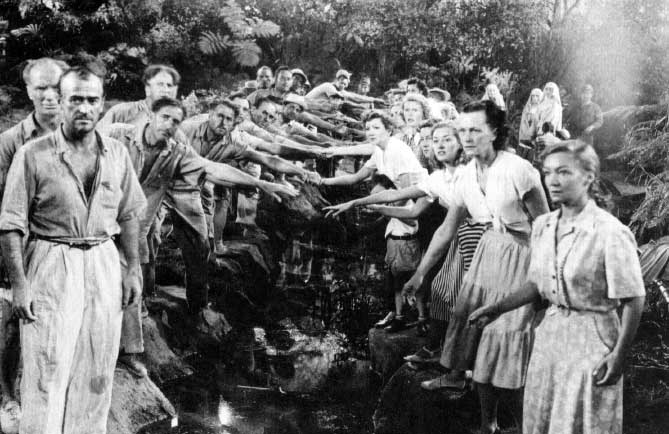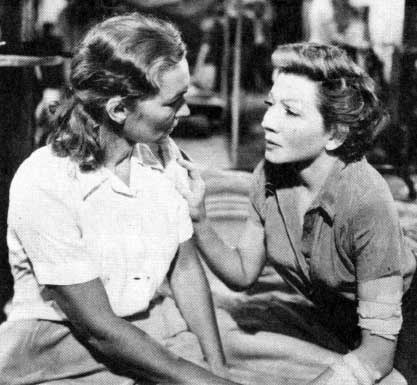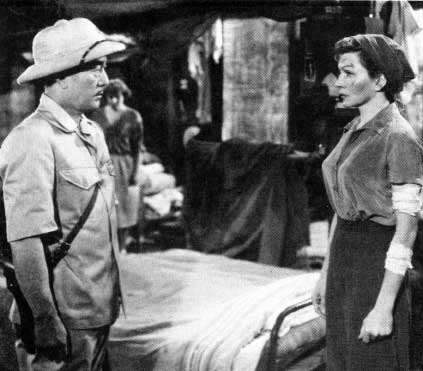Dir.: Jean Negulesco
Plot: A colonial official's wife struggles to survive imprisonment in a Japanese POW camp in Borneo.
To be honest, I downloaded Three Came Home simply because the story sounded interesting. Empire of the Sun is one of my favourite movies and I do love a good POW drama, especially ones like this that are based on a true story. However, I could not have known that I was about to discover one of my all-time favourite films. So many things about it knocked me for six, but the first and foremost of these has to be Claudette Colbert's lead performance as Agnes Keith.
Maybe it's because I'd only ever seen her in romantic comedies, but never in a hundred years would I have thought she could pull out a turn like this. Scrubbed face, grubby off-the-rack clothes, tangled hair (although her face always retains the unsinkable beauty that is good bone structure), she sweats and stumbles through her ordeal with a kind of grimy desperation that is truly touching. There is no trace of the glamorous socialite in Colbert as she frantically tends to her feverish son (the adorable Mark Keuning), eats scraps looted from rubbish bags or crawls in the mud to collect a note from her husband. She really brings to the fore the vulnerability of these women, away from their husbands and at the mercy of an unsympathetic enemy, trying to keep themselves and their children alive. The scene in which a guard attempts to rape her as she is taking down washing after dark in particular hammers this home, and the scene itself is extremely tense and rather brutal for the time - the struggle between the two is desperate and doesn't look one bit choreographed (perhaps this was the scene where she sustained the back injury that prevented her from taking the role of Margo Channing in All About Eve).
She is supported by a great cast of little-known English and Australian (and sometimes sounding like both) actresses as her fellow internees, particularly Florence Desmond as the indomitable Betty, whose bravery and quick wits ensure the safety of her fellow prisoners on more than one occasion. One scene especially stands out for me - in the barracks at night, from their beds they softly sing the sentimental World War I ballad 'There's A Long, Long Trail'. It's perfect, and absolutely heartbreaking. On top of this, we have the wonderful Sessue Hayakawa playing the real-life camp commander, Colonel Suga. He is a remarkable character for a film written a mere five years after the war's end - kind and cultured, slipping sweets to the children - and Hayakawa plays him with all the dignity the script suggests. In fact, the portrayal of the Japanese is much more balanced in Three Came Home than in almost any other WWII film I've seen, including many made in recent years. Yes, they do the two things that Japanese soldiers in movies always do: 1. back-hand slap someone who sasses them and 2. laugh hysterically for no reason at something, but on the whole they are presented as human beings rather than shouty robots with big swords.
Another thing - the film looks fantastic. I'm used to most pre-1960s movies being shot on a set with some aesthetically beautiful but not highly convincing matte backdrops (this being the worst offender - it's like June Allyson et al. are about to be swallowed whole by the forces of colour). But Three Came Home was shot largely on-location, as the title card proudly informs us, and it shows. You can smell the hot grass and sawdust coming up out of the screen, and the marches between camps seem far more viceral when it's real jungle they're trudging through. Overall, the realism factor is extremely high, and that includes several scenes of brutality which really make your stomach jump even today. The woman are slapped, pushed and knocked around with a stunning immediacy which makes you genuinely afraid for them, just as they are constantly insecure in their fragile safety. The film's most shocking scene involves a group of Australian soldiers looking for some fun. I won't spoil it for you, because it packs a wallop that deserves to remain a shock. Suffice to say that it is utterly wrenching, and made me decide to switch the film off and carry on the next day.
One of the most gritty, harrowing but ultimately uplifting tales of human survival in that overpopulated genre. It's now in the public domain, so you really have no excuse not to...
10/10



Great review of a great film. I reviewed it in 2010 and we both came away with some of the same impressions. Good job. If you'd like to check out my review, click on the link http://bit.ly/fYYl9B.
ReplyDelete